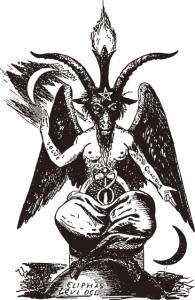The dualism of good and evil.
The guiding ideal of the Cathars was to return Christianity to its primitive origins and, seeking to counter the opulent worldliness of the Catholic Church. This Christian reform movement won widespread social acceptance from the tenth to the thirteenth centuries. However, Catharism contains certain pagan reminiscences, most notably of a Gnostic and Manichaeist provenance, which influenced its interpretation of the New Testament.
Cat-worshipping Satanists?

These Christians were convinced that there was not one God but two gods diametrically opposed one to the other. The good god was the creator of spiritual reality, whereas the the evil god was the author of material reality contaminated by sin. The theology of Catharism was dualistic, and most scholars accept it took two forms, absolute and mitigated dualism (the latter being more easily reconcilable with orthodox Christian theology).
The Devil was responsible for the creation of material world
Some scholars might argue that they did not believe in the incarnation of the Son of God, since they regarded Jesus Christ as a concept that showed the way to perfection. They defended the idea that a good God would never allow his son to incarnate in material form and, in this sense, pointed to the Old Testament God as the Devil himself and consequently rejected his teachings as well as the dogma of the Trinity and the concept of Hell.
Escaping the veil of the material world
They denied the validity of Baptism because water is a material element and therefore impure. They denied the value of sex for the purpose of procreation, since they considered it a grave error to bring a pure soul into this material world. And, for the same reason, they also refused to eat food deriving from sexual reproduction, including all meat, eggs and dairy products. Fish were exempt, since they thought that fish reproduced asexually.
Cathars cared for the most vulnerable people in society
Respected and appreciated by civil society, they translated the Sacred Scriptures from Latin into the Occitan language, the vernacular tongue of their parishioners. In addition, they taught orphans literacy skills while instructing them in the basic tenets of the Cathar faith such as nonviolence and the importance of honesty, which they considered the highest value of respect in a society. In fact, the honesty of the Cathars became proverbial, and all strata of society entrusted their money to them. They, in turn, lent usually to other less favoured citizens to set themselves in a trade and get out of misery, or to anyone who wanted to dedicate themselves to the arts or make progress in the field of learning and letters. The money loaned had to be returned little by little to serve others who needed it. The Cathars created the first European ethical banking system.
Occitania was declared a land contaminated by heresy.
Persecuted, condemned and systematically executed until their extinction, with the fall of the Cathars fell beautiful Occitania devastated, razed to the ground and ravished, with her people subjected to genocide for their valiant attempt to defend tolerance and the freedom of ideas, putting people’s lives before religious beliefs . Surprisingly, most Occitans remained Catholics and disagreed with that Cathar duality of good and evil, especially with the concept that the world was the work of Satan. Nevertheless large sections of the Occitan nation were willing to die to defend the rights of the believers.
Shame at the crimes committed against the Occitans
#Òc